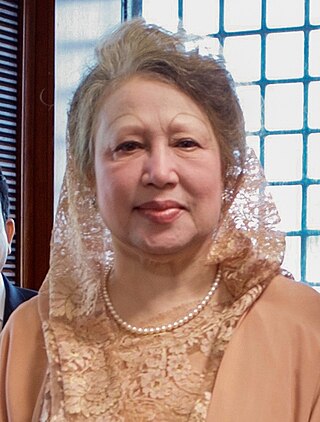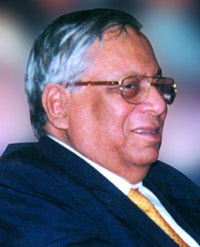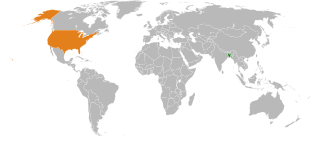
The foreign relations of Bangladesh are Bangladesh's relationships with foreign countries. The Government of Bangladesh's policies pursue a moderate foreign policy that heavily relies on multilateral diplomacy, especially at the United Nations (UN) and the World Trade Organization (WTO). Since its independence in 1971, Bangladesh has stressed its principle of "Friendship towards all, malice towards none" in dictating its diplomacy. As a member of the Non-Aligned Movement, Bangladesh has tended to not take sides with major powers. Since the end of the Cold War, Bangladesh has pursued better relations with its neighbours and other nearby states.

The Bangladesh Nationalist Party is a major political party in Bangladesh. It was founded on 1 September 1978 by the late Bangladeshi president Ziaur Rahman, after the presidential election of 1978, with a view of uniting people with a nationalist ideology. Following Rahman's assassination in 1981, his widow, Khaleda Zia, took over leadership of the party and presided as chairperson until her imprisonment, in 2018. Since then, Tarique Rahman, the son of Rahman and Zia, has served as acting chairperson and has run the affairs of the party from London.

Begum Khaleda Zia is a Bangladeshi politician who served as the prime minister of Bangladesh from March 1991 to March 1996, and again from June 2001 to October 2006. She was the first female prime minister of Bangladesh and second female prime minister in the Muslim world, after Benazir Bhutto. She is the widow of former president of Bangladesh Ziaur Rahman. She is the chairperson and leader of the Bangladesh Nationalist Party (BNP) since 1984, which was founded by her late husband in 1978.

Hussain Muhammad Ershad was a Bangladeshi military officer and politician who served as the president of Bangladesh from 1983 to 1990, heading a military dictatorship.
Shahabuddin Ahmed was a Bangladeshi politician who served as the President of Bangladesh from 1996 to 2001, and the Chief Justice of Bangladesh from 1990 to 1995. He previously served as the acting president during 1990–91 when Hussain Muhammad Ershad resigned from the post. He headed a caretaker government and held a general election in February 1991.

Baridhara is an upscale residential area in Dhaka, Bangladesh. It is located on the east of and north east of Gulshan across Gulshan-Baridhara Lake. It has special zones designated for diplomats, and many of the city's foreign embassies and high commissions are situated here. There are mainly three areas diplomatic zone mainly in the south-west portion, general residential area in eastern portion and an adjacent DOHS area in north-east portion.

Humayun Rasheed Choudhury was a Bangladeshi career diplomat and Speaker of the Bangladesh National Parliament from 1996 to 2001. He was elected president of the 41st session of the UN General Assembly in 1986. He was awarded Independence Day Award in 2018 posthumously by the Government of Bangladesh.
1986 (MCMLXXXVI) was a common year starting on Wednesday of the Gregorian calendar, the 1986th year of the Common Era (CE) and Anno Domini (AD) designations, the 986th year of the 2nd millennium, the 86th year of the 20th century, and the 7th year of the 1980s decade.
1984 (MCMLXXXIV) was a leap year starting on Sunday of the Gregorian calendar, the 1984th year of the Common Era (CE) and Anno Domini (AD) designations, the 984th year of the 2nd millennium, the 84th year of the 20th century, and the 5th year of the 1980s decade.

Bangladesh-United States relations are the bilateral relations between the People's Republic of Bangladesh and the United States of America. For the United States, Bangladesh is the 38th largest goods supplier and 60th largest export market. For Bangladesh, the United States is the largest export market. The two countries signed a bilateral investment treaty in 1986. U.S. companies are the largest foreign investors in Bangladesh. The U.S. government is the leading contributor of humanitarian assistance in response to the Rohingya crisis. Both nations have announced similar views for a Free and Open Indo-Pacific. Bangladesh has nurtured amicable relationships with all nations, prioritizing the enhancement of the socio-economic well-being of its people.

Pakistan and Bangladesh are both South Asian Muslim-majority countries. Following the end of British rule in India, the two countries formed a single state for 24 years. The Bangladesh Liberation War in 1971 resulted in the secession of East Pakistan as the People's Republic of Bangladesh. Pakistan recognized Bangladesh in 1974 after pressure from across the world. Today, bilateral relations between Bangladesh and Pakistan are considered to be cordial.

The history of Bangladesh (1971–present) refers to the period after the independence of Bangladesh from Pakistan.

Bangladesh and Indonesia established diplomatic relations in 1971. Indonesia is the world's largest Muslim country, whereas Bangladesh is the world's fourth largest Muslim country. They are partners in the United Nations and various multilateral organisations, particularly in international peacekeeping, the Developing 8 Countries, the Non-Aligned Movement, the World Trade Organization and the Organisation of Islamic Cooperation. Bangladesh has an embassy in Jakarta, whereas Indonesia has an embassy in Dhaka. Official diplomatic relations were established in 1972 after Indonesia became one of the first Muslim countries to recognise independent Bangladesh.

Brunei and Singapore established diplomatic relations in 1984. Brunei has a high commission in Singapore, and Singapore has a high commission in Bandar Seri Begawan. Brunei and Singapore have close and friendly relations with extensive defence co-operation. Both countries are members of ASEAN and Commonwealth of Nations.
Anisul Islam Mahmud is the former Minister of Environment and Forest and Minister of Water Resources in the Cabinet of Bangladesh in the Third Hasina ministry from 2014 to 2019. He previously served as Minister of Foreign Affairs from July 1985 to December 1990 under President Hussain Muhammad Ershad.
Air Vice Marshal Sultan Mahmud, Bir Uttom was a former chief of the Bangladesh Air Force and a former deputy chief martial law administrator. As a member of Kilo Flight, he is one of the founders of Bangladesh's Air Force. He later served as minister of Industries. He received the Independence Day Award from the Government of Bangladesh in 2018.
Air Vice Marshal (retd.) Abdul Ghaffar Mahmud is a former chief of the Bangladesh Air Force. He negotiated the release of hostages from the hijacked Japan Airlines Flight 472. For his role in keeping the situation under control and securing the lives of every single passenger, Japanese government had conferred upon him the "Order of the Rising Sun, Gold and Silver Star" awards.
Bangladesh and Maldives established diplomatic relations in 1978. Rear Admiral Akhtar Habib is the Bangladeshi High Commissioner to the Maldives.
M Shameem Ahsan is a retired Bangladeshi diplomat and former Permanent Representative of Bangladesh to the United Nations Office in Geneva. He is a former Ambassador of Bangladesh to Brazil.












